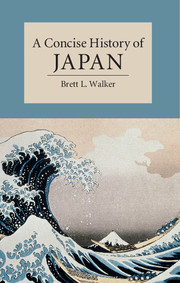Book contents
- Frontmatter
- Dedication
- Contents
- List of Illustrations
- List of Maps
- Preface
- Chronology
- Introduction
- 1 The Birth of the Yamato State, 14,500 bce – 710 ce
- 2 The Courtly Age, 710–1185
- 3 The Rise of Samurai Rule, 1185–1336
- 4 Medieval Japan and the Warring States Period, 1336–1573
- 5 Japan’s Encounter with Europe, 1543–1640
- 6 Unifying the Realm, 1560–1603
- 7 Early Modern Japan, 1600–1800
- 8 The Rise of Imperial Nationalism, 1770–1854
- 9 Meiji Enlightenment, 1868–1912
- 10 Meiji’s Discontents, 1868–1920
- 11 The Birth of Japan’s Imperial State, 1800–1910
- 12 Empire and Imperial Democracy, 1905–1931
- 13 The Pacific War, 1931–1945
- 14 Japan’s Post-War History, 1945–Present
- 15 Natural Disasters and the Edge of History
- Glossary
- Further Reading
- Index
6 - Unifying the Realm, 1560–1603
Published online by Cambridge University Press: 05 March 2015
- Frontmatter
- Dedication
- Contents
- List of Illustrations
- List of Maps
- Preface
- Chronology
- Introduction
- 1 The Birth of the Yamato State, 14,500 bce – 710 ce
- 2 The Courtly Age, 710–1185
- 3 The Rise of Samurai Rule, 1185–1336
- 4 Medieval Japan and the Warring States Period, 1336–1573
- 5 Japan’s Encounter with Europe, 1543–1640
- 6 Unifying the Realm, 1560–1603
- 7 Early Modern Japan, 1600–1800
- 8 The Rise of Imperial Nationalism, 1770–1854
- 9 Meiji Enlightenment, 1868–1912
- 10 Meiji’s Discontents, 1868–1920
- 11 The Birth of Japan’s Imperial State, 1800–1910
- 12 Empire and Imperial Democracy, 1905–1931
- 13 The Pacific War, 1931–1945
- 14 Japan’s Post-War History, 1945–Present
- 15 Natural Disasters and the Edge of History
- Glossary
- Further Reading
- Index
Summary
What makes the legacies of the Japanese sixteenth-century encounter with Europeans so important is that it coincided with the final years of the Warring States period and the birth of the age of unification (1560–1603). During this time, three ambitious warlords sought to unify the realm. At roughly the same time that the Portuguese strengthened their hold over Nagasaki, a young warrior in central Japan began his improbable climb to supremacy. Oda Nobunaga (1534–82), first of the ‘three great unifiers’, began the process of breaking down the culture of lawlessness and medieval regionalism to unify the realm under a single, though never completely hegemonic, shogunal authority. Indeed, none of the three unifiers accomplished complete unification, as daimyô continued to assert political and economic control in the seventeenth and eighteenth centuries. Nonetheless, their achievements defined Japanese politics for generations to come. The modern Japanese nation was, to be sure, a product of modern forces that swept the world in the nineteenth century, but it was also a product of the brutal labour of the warlord unifiers, as they struggled to reassemble the pieces in the aftermath of the Warring States period and cobble together a unified realm.
Japonius Tyrannus
Oda Nobunaga was forged in the crucible of Warring States violence (Figure 10). The forging of his character began in his youth. In 1551, his father, Nobuhide (1510–51), lord of Owari domain, died suddenly of disease. When the prayers of Buddhists had failed to save his father, Nobunaga, according to the Jesuit Luís Fróis, locked the monks in a temple, encouraged them to pray harder, and shot some of them with harquebuses from the outside to provide incentive. ‘They had better pray to their idols with greater devotion for their own lives’, he reportedly said. The Jesuit’s account is surely embellished, riddled with his own prejudices about the ‘pagan’ religion, but Nobunaga’s harsh treatment of Buddhist sectarians later became infamous. At his father’s funeral, he impetuously ‘proceeded to the altar, suddenly grabbed a handful of incense powder, threw it on the altar, and left’, leading some in the Oda family to believe he was overly eccentric and unfit to rule Owari domain.
- Type
- Chapter
- Information
- A Concise History of Japan , pp. 102 - 123Publisher: Cambridge University PressPrint publication year: 2015



